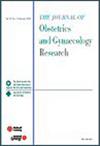Effects of ubiquinol intake on improving menstrual symptoms among female healthcare workers: An open-label pilot study
Abstract
Aim
This study aimed to investigate the effects of ubiquinol on menstrual symptoms.
Methods
This open-label trial involved 86 female healthcare workers aged 21–48 years. The study design included an observation period and a ubiquinol intake period. During the intake period, the participants consumed two soft capsules containing 75 mg of ubiquinol daily (i.e., 150 mg/day). At baseline and after the observation and intake periods, the participants underwent blood testing and completed the Pittsburgh Sleep Quality Index to evaluate their sleep condition. In addition, the Menstrual Distress Questionnaire was completed before, during, and after each of the first seven menses. All statistical analyses were performed, stratified by the median age of the participants.
Results
Regarding the Menstrual Distress Questionnaire, in the younger group (age: <36 years), a significant improvement was observed in menstrual “Control” (p = 0.049) by ubiquinol intake. In the older group (age: ≥36), the effects of ubiquinol on the improvement of premenstrual “Negative affect” and “Control” scores reached significance (p = 0.02 and p < 0.01, respectively); further, menstrual “Control” score was significantly improved (p = 0.03). In addition, the Pittsburgh Sleep Quality Index showed a significant effect of ubiquinol in the older group.
Conclusions
This pilot study indicated that ubiquinol alleviated menstrual symptoms among premenopausal female healthcare workers. In those aged ≥36 years, ubiquinol intake may reduce premenstrual irritability and improve sleep quality.

 求助内容:
求助内容: 应助结果提醒方式:
应助结果提醒方式:


